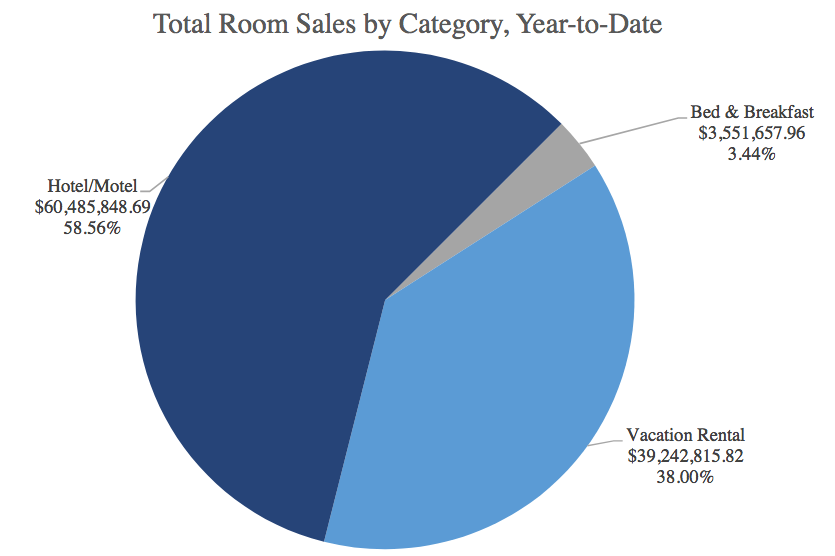In the midst of COVID-19 and political uncertainty at the national level, ever more tourists to Buncombe County are seeking a room of their own — as long as that room is part of a short-term rental. According to Chris Cavanaugh, interim CEO of Explore Asheville, 82% of the county’s roughly 3,500 whole-house STRs were occupied during October, up from 65% during October 2019.
By comparison, Cavanaugh told the Buncombe County Tourism Development Authority board during a Nov. 18 meeting, hotel occupancy stood at 77% for October, down from 82% for the same month last year. And while overall hotel revenue was down more than 27% year-over-year in September, the latest month for which data is available, overall vacation rental sales that month increased by about 55% year-over-year.
STR revenue in September represented well over a third of Buncombe County’s $36.32 million in total lodging sales for the month, a figure down just 9% from last September. During the first crest of the coronavirus pandemic in April, year-over-year monthly lodging sales were down 93%.
Cavanaugh noted that sales, and their resultant occupancy taxes, were significantly higher than the BCTDA had projected in its fiscal year 2020-21 budget. While that document had assumed just under $695,000 in tax revenue would be collected for September, the actual figure was almost $1.6 million, or more than twice as much. The board is also not currently funding any paid advertising, making its expenditures significantly lower than usual.
Himanshu Karvir, the BCTDA board’s chair and CEO of Asheville-based hotel group Virtelle Hospitality, suggested that the trend toward STRs reflects worries about COVID-19 and the potential risk of viral transmission in shared spaces. “The whole-house vacation rental piece is what’s driving that,” he said. “More and more people are trying to do that right now than staying in hotels.”
And board member John McKibbon, whose McKibbon Hospitality manages the AC Hotel Asheville, Aloft Asheville and Kimpton Hotel Arras, acknowledged that his form of lodging may soon no longer dominate Buncombe County. “The trend continues to be up for vacation rentals versus hotels, and at some point, I think vacation rentals may surpass the amount of income coming in from hotels,” he said.
Despite the importance of STRs to county occupancy tax revenue, the BCTDA board that oversees its spending includes no vacation rental owners or managers. Per the state legislation that established the authority, six board seats are reserved for “owners or operators of hotels, motels, bed-and-breakfasts, or vacation rental management companies,” all of which are currently held by hoteliers.
In February, the Asheville Buncombe Hotel Association had proposed changing the legislation to explicitly include STR owners and other tourism partners on the board. However, that change was caught up in disagreement with Buncombe County officials over shifts to allowable occupancy tax spending, as well as the state’s COVID-19 response, and has yet to go before the General Assembly.




Before you comment
The comments section is here to provide a platform for civil dialogue on the issues we face together as a local community. Xpress is committed to offering this platform for all voices, but when the tone of the discussion gets nasty or strays off topic, we believe many people choose not to participate. Xpress editors are determined to moderate comments to ensure a constructive interchange is maintained. All comments judged not to be in keeping with the spirit of civil discourse will be removed and repeat violators will be banned. See here for our terms of service. Thank you for being part of this effort to promote respectful discussion.